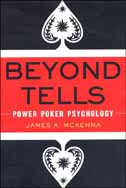
Beyond Tells: Power Poker Psychology

McKenna's 'Beyond Tells' Explores Poker Psychology
Poker may be a game of strategy and tactics, but it's also a game of people. As with any contest, one gains an advantage by understanding oneself as well as one's opponents. Consequently, poker Nick Christenson is widely regarded as one of the best gambling book reviewers publishing today. He is a contributor for Poker Player magazine, and has published in Full-Tilt and Gambling Times. He is also the editor of the very funny 'Casino Death Watch,' which chronicles the comings and goings of casinos in Las Vegas. He is an avid poker and blackjack player. Nick's website is www.jetcafe.org/~npc/ psychology is necessary before one can achieve mastery of the game. Some books have been written that cover this topic, but many questions that serious poker students might have on this subject remain unanswered. In Beyond Tells, psychology PhD Jim McKenna attempts to address this gap in the literature.
Nick Christenson is widely regarded as one of the best gambling book reviewers publishing today. He is a contributor for Poker Player magazine, and has published in Full-Tilt and Gambling Times. He is also the editor of the very funny 'Casino Death Watch,' which chronicles the comings and goings of casinos in Las Vegas. He is an avid poker and blackjack player. Nick's website is www.jetcafe.org/~npc/ psychology is necessary before one can achieve mastery of the game. Some books have been written that cover this topic, but many questions that serious poker students might have on this subject remain unanswered. In Beyond Tells, psychology PhD Jim McKenna attempts to address this gap in the literature.
Every poker player has had the experience of sitting at the poker table wondering what in the world their opponent is thinking. As we might expect, this isn't a simple question to answer. Many books have partially addressed this question, but Beyond Tells goes further than any other book I've read toward getting into the mind of poker players, focusing on those who regularly lose.
McKenna's insights also apply to those poker players looking for some assistance in examining their own strengths, weaknesses, and motivations. The author provides many ways in which poker players may be categorized, and these can be applied to ourselves at least as readily as we can apply them to others. I don't know if this book is quite as valuable for self-reflection as some other books I've read, but players may find it worthwhile in this regard.
Of course, Beyond Tells is not without flaws. While this book is not intended as a strategy book, McKenna provides some poker advice in his examples. I don't think his advice is very strong, and I found what he had to say about blackjack to be downright disturbing. Nearly all of the poker examples in the book involve seven card stud, but there is no preamble warning us of this, so the many players out there that play exclusively hold'em in public poker rooms may initially be confused by what they read. McKenna's player rating system is a little odd. It would be helpful if one knew that a score of 5/10 represents an optimum amount of aggression, for example, not a average amount. Also, even though the book has a 2005 copyright date, none of its citations were published before 2000, and many references seem even more dated than that. It looks to me like the bulk of this book was actually written sometime in the mid-90s.
In my opinion, these faults are significant, but are more than overcome by the book's considerable strong points. The focus of Beyond Tells is in understanding the motivations of poker players. The language used tends toward the "pop psychological", but this is probably necessary. How many of us could understand a truly clinical book on this subject? McKenna does the best job of any author I've read in explaining what's going on in the brains of poker players and how a smart player can best adapt to it. As the title of his book suggests, this book goes beyond the the classic, Caro's Book of Poker Tells. It contains new ideas and concepts that I found to be worth reading.
Beyond Tells isn't the book that every poker reader is looking for. It isn't a strategy book, and it has some flaws. However, those who are looking for additional information that will help them understand their own motivations and those of their opponents will likely find something of value here. I recommend this book as a good addition to the literature on the subject of poker psychology.
